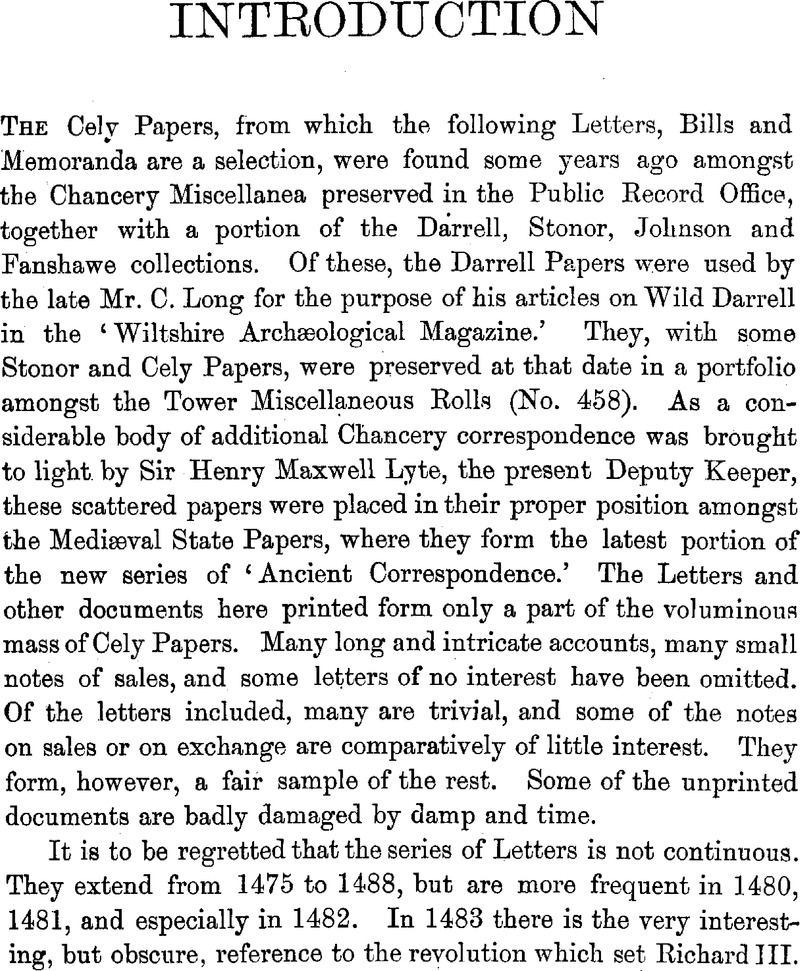No CrossRef data available.
Article contents
Introduction
Published online by Cambridge University Press: 24 December 2009
Abstract

- Type
- Introduction
- Information
- Copyright
- Copyright © Royal Historical Society 1900
References
page vi note a See Letters of April 18 and 20, 1482.
page ix note a Ordinance of the Staple.
page x note a The incorporation of the merchants was perhaps intended to strengthen the King's power of negotiating with them for grants of money, apart from the rest of the commonalty. They formed almost a separate estate of the realm, and, as was the case with the clergy, the Crown could offer them privileges in return for subsidies behind the back of the Parliament.
page xi note a Hodie, the burrs in wool, are the great difficulty to the manufacturer. Messrs. Harmel Frères, and Holden of Rheims and Bradford, have adopted a ‘burring’ machine, which partly overcomes it, but carelessness, much more fraud, in allowing foreign matters to be mixed with wool, very seriously damage it. See Burnley, History of Wool and Wool-combing, p. 96, &c.
page xiii note a Rymer, xii. 80, &c.
page xvi note a Salisbury Ledger A. 1, fo. 105 β.
page xvii note a According to De Comines, Louis always had in view the possibility of recovering Calais, but on his deathbed warned his son not to attempt it. He knew that it would, if attempted, make England the active ally of Burgundy.
page xxii note a Rymer, xii. 66 seqq.
page xxiii note a Does not this throw light on the disputed origin of the powers given to a Committee of the Council by the Act 3, Hen. VII. 5? It was a Committee of the Magnum Concilium, not of the Concilium Ordinarium.
page xxv note a In 1480 the fixing of the comparative value of English and French money was made the subject of an agreement between Edward and Louis (Rymer, xii. 115). Edward had plenty of opportunity of appraising the value of French money.
page xxvii note a Rymer, xii. 113.
page xxviii note a Rymer, xii. 128.
page xxviii note b Subsequently Bishop of St. David's in 1483, then Bishop of Winchester 1493 to 1501.
page xxviii note c Rymer, xii. 137.
page xxx note a Kervyn de Lettenhove, Histoire de Flandre.
page xxxi note a English Hist. R., July 1897. ‘An Unknown Treaty between Edward IV. and Louis XI.’
page xxxi note b Chroniques de Jean de Molinet.
page xxxii note a Rymer, xii. 320.
page xxxv note a The Danes had a grievance against England, because English ships visited Iceland. A treaty had been made in 1479 forbidding this intercourse without license (Rymer, xii. 100).
page xxxvi note a Rainham in Essex apparently, close to the Celys' country seat, not Rainham in Kent. For the Mary of Rainham took over an Essex cheese to Calais (Letter, October 31, 1481). But Rainham on the Medway was a small port under Elizabeth.
page xlii note a A God's penny, money paid to ratify a bargain.
‘I draw you to recorde lordes all;
With that he cast him a God's penny.’
—Ballad of the Heir of Linn.
page xlviii note a Inq. P. M. 9 Hen. VII. Sept. 20.




